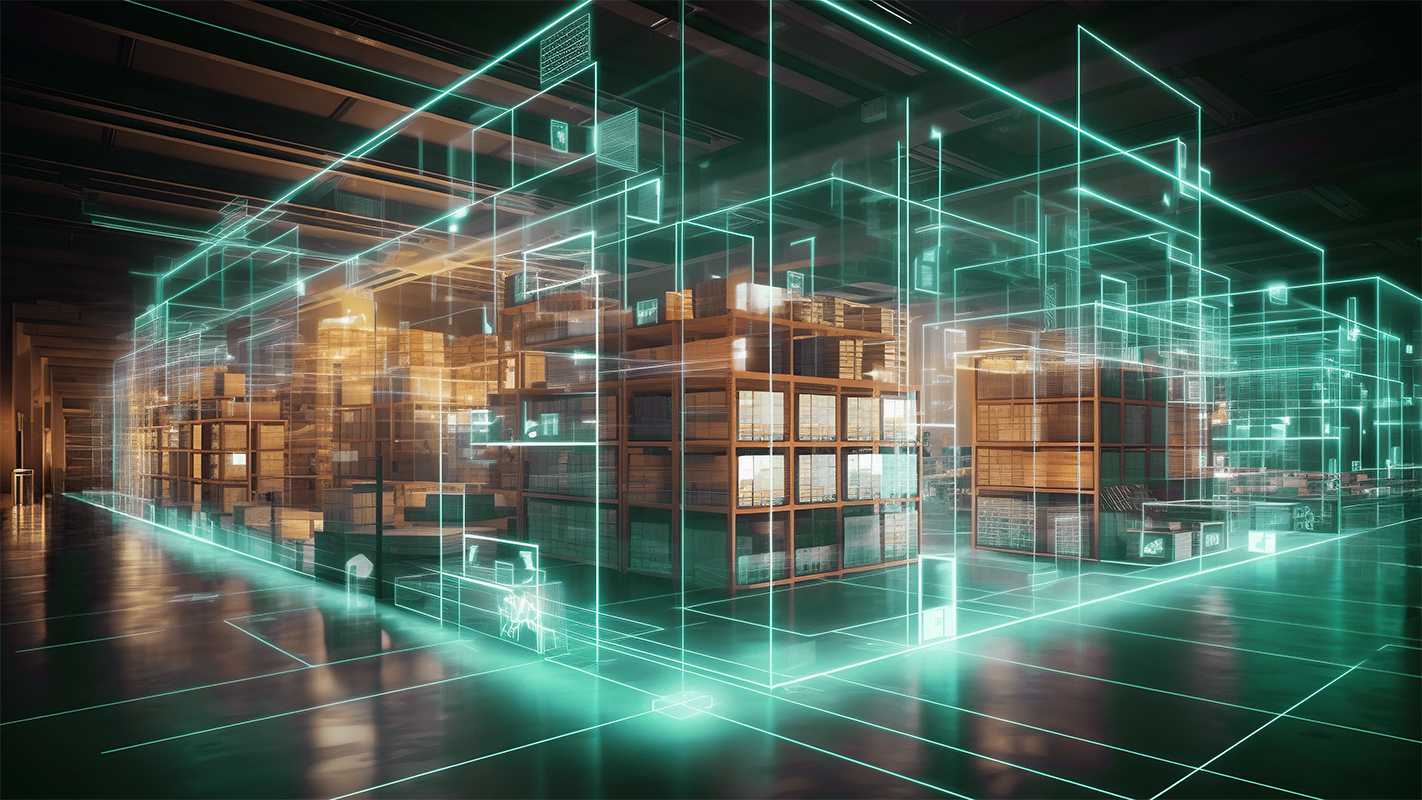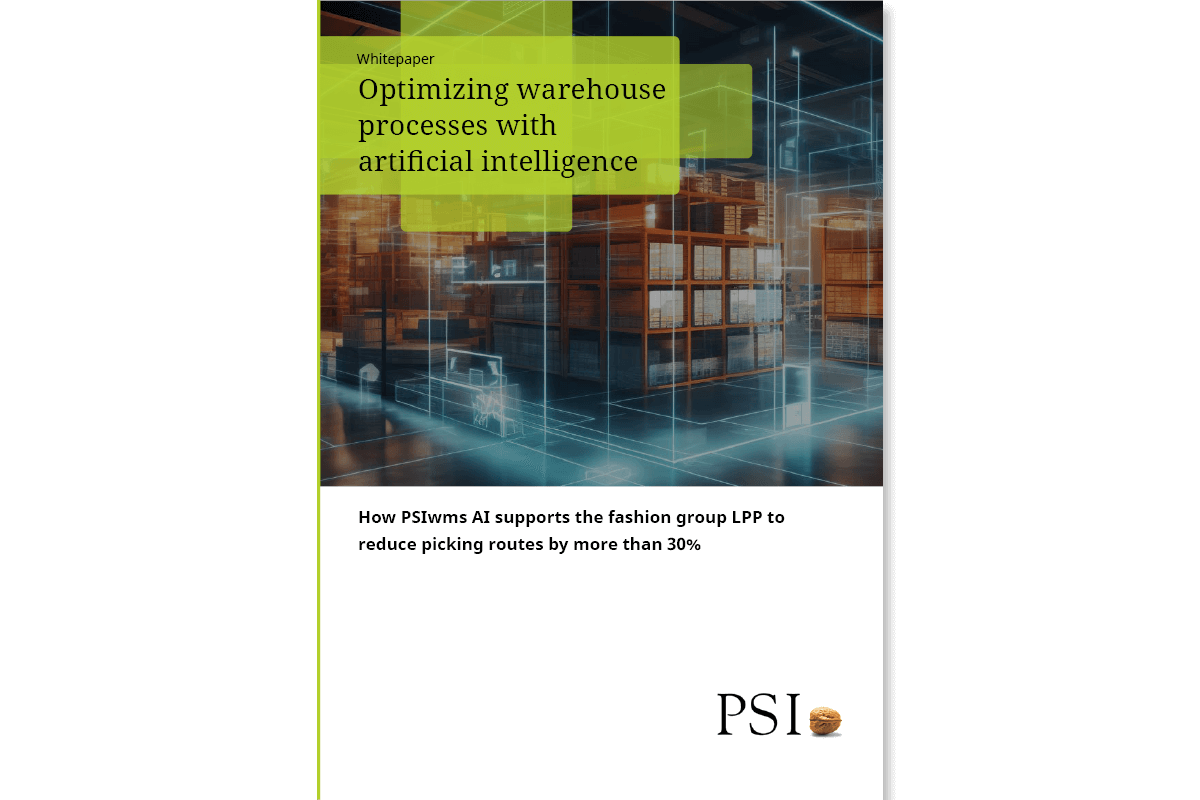
Artificial intelligence is revolutionizing intralogistics. What seemed like science fiction just a short time ago will soon become a reality in many warehouses: AI systems will analyze data in real time, make independent decisions, and optimize processes to an unprecedented extent. But according to the Fraunhofer Institute for Material Flow and Logistics IML, barely a third of WMS providers currently use AI in their systems. This will change in the future. Learn how artificial intelligence is becoming a cornerstone of modern logistics processes and how you can use this technology.
Challenges
Artificial intelligence is the most important development trend in the WMS market, and innovations in this area arouse enormous interest among potential users. Many people realize that those who implement AI structures early on will find it easier to keep pace with the rapid developments. At the same time, interested parties are specifically looking for offerings that provide real added value.
Dynamic algorithms and large amounts of data
Machine learning, an AI discipline that uses dynamic algorithms and large amounts of data (big data), is particularly in demand. These algorithms enable the automated processing of data, which leads to a continuous learning process. Machine learning allows different data streams to be linked together. This allows patterns to be identified, which in turn can be used to predict future work processes and make optimal decisions as a result. With the help of intelligently evaluated data, productivity and efficiency increases can be achieved as future production and transport volumes can be predicted more accurately.
Customers want very short delivery times
In the age of e-commerce, one thing is particularly important for logistics companies: the fastest possible dispatch. In order to meet the requirements of end customers, who are used to very short delivery times, dynamic intralogistics is essential. Ideally, this involves designing strategies that can optimize internal workflows and significantly reduce travel times within the warehouse. AI can play a decisive role here.
AI for optimizing processes
AI can contribute to process optimization, particularly in the areas of procurement, production and sales and distribution within warehouse management. Warehouse logistics in particular offer many opportunities for optimized warehouse management, which can generate a significant competitive edge. However, many companies find it challenging to deal with large amounts of data. Developing concrete approaches, recognizing potential and creating automated processes from the results can initially seem overwhelming. According to a market report by Fraunhofer IML, WMS providers primarily use artificial intelligence for personnel requirements, order forecasting, and fleet management. In the future, functionalities such as batch formation and storage location allocation could become increasingly sought-after in the market.
AI in German companies: Study results
- Fraunhofer IML: Most important trend – 72% of WMS providers see AI as a “top trend.”
- Bitkom: 73% of German companies consider AI to be the most important technology of the future.
- BVL: One in five logistics companies will use AI by 2024.
- Deloitte: 39% of German companies plan to significantly increase their AI investments.

Whitepaper "Optimizing warehouse processes with AI"
Read our whitepaper how PSIwms AI can optimize your warehouse processes, making them more efficient, cost-effective, and future-proof. Integrating artificial intelligence into your warehouse processes can not only increase productivity, but also reduce operating costs, and improve the overall efficiency of your logistics. Take advantage of modern technology to ensure your long-term competitiveness.
General Conditions
When using artificial intelligence in intralogistics, there are principles that should be observed when implementing it. Anyone who only imagines fully automated work processes and robots in an intelligent warehouse is only scratching the surface.
Intelligent warehousing begins with a strategic realignment of a company's processes, using data sources to meet the requirements of the product and the end user.
- Focus on understanding the entire process instead of individual automation
AI in warehouse logistics is often associated with futuristic scenarios involving autonomous robots or fully automated goods flows. However, this idea falls short. Intelligent warehousing begins with analyzing and strategically realigning existing processes. The focus is not on full automation, but rather the targeted integration of AI to improve specific, relevant steps throughout the entire logistics chain. - Data availability and quality
The basis of any AI application is access to high-quality, structured and consolidated data. AI can only recognize patterns, make forecasts, or suggest optimizations when data sources from different systems – such as WMS, ERP, IoT sensors, or transport systems – are reliably linked. Therefore, developing appropriate data infrastructures, such as 'data lakes', is essential. - Targeted use of technology
It is worthwhile to define goals for the use of AI. Should it optimize picking routes, deploy personnel more efficiently, or plan inventory levels more closely in line with demand? Without defined optimization goals, using AI risks becoming an inefficient experiment. Successful projects therefore begin with defining use cases – practical applications that deliver measurable added value. - Organizational and cultural prerequisites
AI not only changes technologies, but also ways of working. Employees must be willing to work with AI systems, and organizations must be open to change. Effective change management, training, and transparent communication are essential for integrating new technologies into everyday warehouse operations.
The relevance of AI for logistics
Characteristics of the logistics industry
- Complex, dynamic environment full of challenges
- Generates large amounts of data (subject to data sovereignty)
- The personnel structure will change in the future
- High economic significance
Characteristics of artificial intelligence
- Maps complex relationships
- Requires large amounts of data
- Generates and captures knowledge
- Powerful optimization lever
*Source: alice Whitepaper AI in logistics
Usage Scenarios
How do companies succeed in developing value-adding processes from the abundance of data volumes? PSIwms AI from PSI gives the answer. This is a platform based on artificial intelligence that focuses on the analysis, planning and optimization of logistics processes. The platform performs thousands of analyses for warehouse operation scenarios every hour and offers optimization recommendations based on these. This enables, for example, the significant shortening of routes along the picking process, the simulation of the effects of new technologies on warehouse operations and the precise identification of bottlenecks in the warehouse.
PSIwms AI at LPP Logistics fulfillment centers
In this video you will learn more about PSIwms AI and the background of the project at LPP.
PSIwms AI in customer use
Since 2020, PSI has collaborated with the National Center for Research and Development (NCBR) on a multiphase project to further develop the AI platform. PSIwms AI was successfully implemented in a pilot project at LPP Logistics, the internal logistics service provider of the LPP Group. The LPP Group owns the fashion brands Reserved, Cropp, House, Mohito, and Sinsay.
A few years ago, the clothing manufacturer's continuous growth, driven by rising e-commerce demand in e-commerce and increasing costs for fuel, materials, and wages, necessitated comprehensive logistics process optimization. The solution: Integrating the PSIwms AI platform, which became fully operational at the beginning of 2023, has enabled LPP Logistics to significantly improve its intralogistics processes. PSIwms AI is now used in all six of LPP's fulfillment centers, which are located in Poland, Romania, and Slovakia. This allows the fashion company to automate much of its intralogistics.
The results in figures
- Picking routes were reduced by over 30%
- Order processing efficiency increased by over 20%
- No need to hire an additional 250 employees
Conclusion
Demand for AI in logistics is steadily growing. According to the 2024 Bitkom report, approximately 75% of German companies plan to invest in artificial intelligence in the future. Nearly half of these companies believe that businesses that do not use generative AI will not survive. A BVL study also found that approximately 40% of logistics companies intend to use AI for logistical and economic tasks within five years. Clearly, more digitally advanced companies will take on a pioneering role and could leave others behind.
What will the future of jobs look like in the age of Industry 4.0 and increasing automation? Will employees have to compete with AI for jobs? One thing is certain: work processes in warehouses will change. Repetitive tasks, such as order picking, are increasingly being automated. However, humans cannot be completely replaced. Instead of replacing humans, AI will take on the role of an assistant. PSIwms AI is one example of this. This technology can optimize picking routes, for example, enabling warehouse employees to work more efficiently and ergonomically. AI also creates new job opportunities, such as maintaining AI-supported robots. Thanks to AI solutions, companies can expand their operations and hire additional warehouse staff.
Downloads for this Use Case
FAQs
How can artificial intelligence improve route optimization within the warehouse?
Artificial intelligence helps to determine the optimal transport routes for moving goods in the warehouse. As a result, products are transported more efficiently from one location to another, saving time and financial resources.
How does artificial intelligence support the prediction of delivery times and delays?
By analyzing traffic, weather conditions and past delivery times, AI enables a more accurate estimate of expected arrival times. This helps to improve supply chain transparency and reliability by providing customers with accurate information and enabling companies to respond better to unforeseen events.
How can companies use artificial intelligence to improve quality assurance in the supply chain?
Along the supply chain, AI recognizes patterns and deviations in production processes, automates quality checks and thus increases the accuracy and efficiency of quality assurance. With the help of machine learning and data analysis, AI supports companies in ensuring high-quality products and identifying potential quality problems at an early stage.
